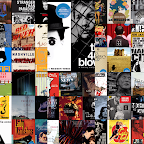 Director: Debra Kirschner
Director: Debra KirschnerYou may want to dub this one Feminist on the Roof but there’s no telling what Fiddler’s Tevye would have made of Sarabeth Cohen (Marla Sokoloff), the young art school graduate struggling against her parent’s adherence to Jewish tradition as she tries to navigate through The Tollbooth.
While Norman Jewison’s landmark musical Fiddler on the Roof served as Tollbooth’s primary inspiration in offering audiences a modern tale of three sisters who “attempt to redefine the parameters of their culture,” as writer/director/producer Debra Kirschner explains on the film’s official website (thetollboothmovie.com), her story is uniquely contemporary and tinged with the filmmaker’s feminist sensibility.
After returning to her Brooklyn nest following college graduation before artistic differences and Sarabeth’s anger towards parental censorship of her politically charged artwork prompts her escape, twenty-two year old self-described “feminist artist” and activist Sarabeth moves in with her medical student sister Becky (Liz Stauber) to weigh her options. While her loyal boyfriend Simon (Rob McElhenney) seems all too willing to compromise his art and settle down in his native Pennsylvania working a regular nine to five job, Sarabeth rails against conformity. Accepting part time work as a cater waitress, she decides to spend more time painting and pounding the gallery pavement, receiving one very memorable critique that while feminist anger is out, cynicism-- as long as one keeps with the times-- never goes out of style.
Meanwhile Sarabeth, who questions, “What is the point of being chosen when you have no choices?” gets frustrated by the old fashioned traditions kept up by her mother Ruthie (Tovah Feldshuh) who seems all too ready to take a submissive attitude towards women’s work, and her quote happy father Isaac (a terrific Ronald Guttman). In keeping with her belief that New York is the capital of attitude, Sarabeth has more than enough attitude to go around and it’s precisely this bratty, unattractive sense-of-entitlement worsened by her obliviousness to respecting the fact that her relatives both paid for her education and our housing her all the while having to put up with her absence of gratitude that made her, in my opinion, the least likable character in the bunch.
Far more fascinating are the two older sisters in the film, namely model daughter Becky who is as devout as her parents but trying to meld her religious upbringing with her newfound realization that she is a lesbian as well as the talented Idina Menzel who plays the married, pregnant Raquel, who seems to be an intriguing blend of her two parents.
Unfortunately, as Sarabeth’s story gets the most screen time, it bogs down Kirschner’s clever set-up by way of the film’s ultimately clichéd coming-of-age paradigm, making it an average success bolstered only by the expert supporting turns. Although it took four years to make its DVD premiere, Kirschner’s high definition video labor of love was a modest success in the east coast film festival circuit, debuting at the Hamptons International Film Festival following its 2004 production.














